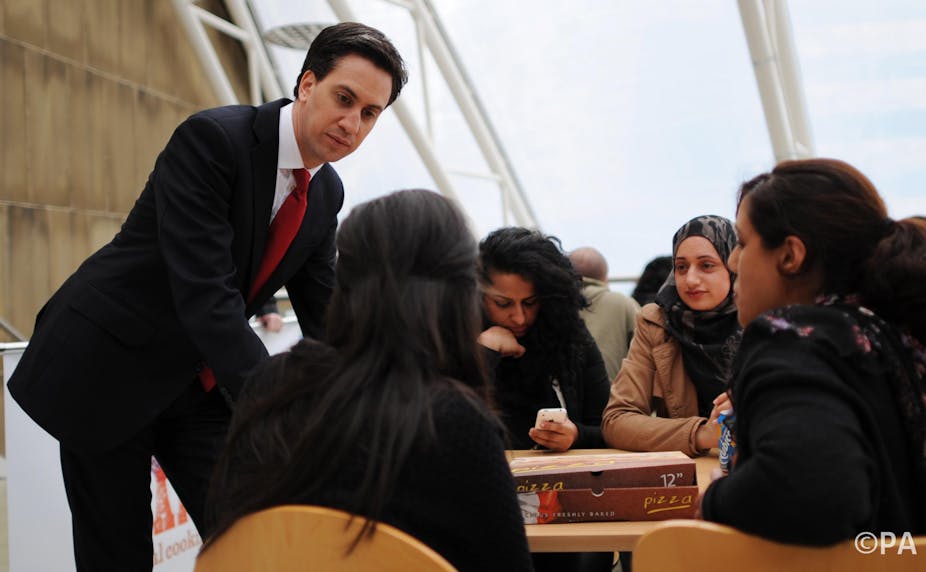I’m an unabashed political junkie. Who’s up, who’s down; who’s in, who’s out. Yet it’s fair to say that pretty much all the day-to-day policy spinning, posturing and firefighting rarely percolates outside Westminster Village. Instead, the history books always judge governments for a handful of big decisions – and undoubtedly, the move toward full higher education marketisation will be one of the long-lasting legacies of this one.
So it was no surprise to see Labour try to put some meat on the bones of its tuition fees policy. It’s been two and half years since Ed Miliband promised to cut them from £9,000 to £6,000 a year. There has been precious little detail since. And to counter the Tory charge of a £1.7 billion funding blackhole, Miliband must show that an opportunistic party conference announcement is now actually workable.
But is this simply the “cost-of-living” line that Labour is using – in many ways successfully – to pitch to the electorate? Higher education is a much more fundamental economic issue, that far outweighs short-term positioning post-Budget. We’re at a crossroads. To compete globally, the UK must have a high-skilled workforce, whether or not people take a degree. Making university finance affordable, fair and sustainable is a part of bigger debate about the society we want and need. It is too important to be plucking new fee levels out of thin air.
A new Browne review
The former BP chief Lord Browne’s independent review, set up by Labour in government, aimed to create a long-term settlement on higher education’s structure.
Much has been adopted, including agreement that students need to pay more. But if university funding is to be a political football again, it is clear we need another crack at consensus-building. For me, post-election, we need a second independent review.
Why? First, to buy some political space. Voters could be forgiven for taking any pledge on tuition fees with a pinch of salt. Let’s not pretend the £9,000 cap is sacrosanct. Browne’s original recommendation for unlimited fees was too toxic.
The cap was a necessary political fudge, not a permanent solution. We’ve already seen prominent vice-chancellors, perhaps rather naïve, call for the cap to be raised. An independent review is the only way to move the debate on. Hiking up fees is not simply a matter of administrative fiat.
Second, we need a cool assessment of the current system. It’s early days. We are less than two years into the new regime and the first students will not start repaying until next summer.
But while applicant numbers have held up nationally, there is real turbulence at institution level, meaning revenues are being hit. Inflation is already nibbling away at the real-terms value of £9,000 fees, compounded by severe cuts in public teaching grants.
Overseas student numbers have reduced for the first time in 30 years. And mature undergraduate numbers have dropped off a cliff. With most course fees drifting up to the £9,000 ceiling, it’s clear the market is not acting “rationally” by cutting prices to compete.
Labour says it is looking carefully at proposals by the former universities secretary John Denham. A serious politician, he has been floating ideas to enable fees to be cut – two-year degrees; vouchers with fee top-ups; more industry sponsorship; and changing repayment terms. But in a system still geared to delivering three-year degrees, there is no magic Whitehall lever. It’s easier said than done to make such ideas scalable across 150-plus institutions and thousands of courses.
Third, we need to analyse the system’s long-term affordability. Ministers now say the estimated loan write-off is 45%, up from the initial forecast of 28%. Even the universities minister’s former special adviser says they got their sums wrong, so it ill-behoves the current administration to speak loftily about Labour’s apparent policy void. Earnings projections are never an exact science but there is no point in setting up a system which risks hitting the public finances with big loan defaults in 30 years’ time.
On top of this, is the cost of scrapping student number caps. The Institute for Fiscal Studies argues it is “economic nonsense” to fund this by selling off the student loan book – arguing that permanent giveaways cannot be funded by a one-off revenue raiser. Yet the Denham proposals seem to require an equally problematic approach: funding a permanent fees cut by recouping unknown savings from fewer defaults in the 2040s.
Winners and losers
The logical extension of marketisation is that there will be winners and losers. Outside the super-elite institutions, it’s clear the home undergraduate market alone will not sustain every single existing institution. Universities will need to diversify their income and investments, while expanding aggressively in the postgraduate and international markets.
The losers will be those who fail to adapt. Is any government content to see institutions wither and fail? How does that square with the rhetoric of putting students at the heart of the system? There is a wider public interest in universities beyond the market – not least when this market is heavily dependent on the choices made by 16 and 17-year-olds.
To end where I began. When it comes to the funding of higher education, remember the old Whitehall adage. Political fixes usually end up with politicians in a fix.

